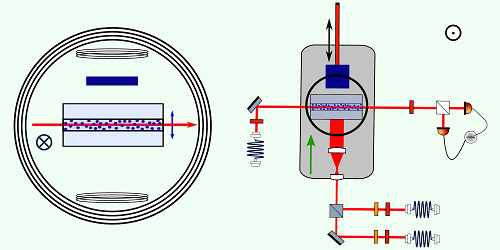Quantum Boost for Magnetic Induction Tomography
Magnetic induction tomography is a contactless, noninvasive method for mapping the electrical and magnetic properties of a material. The technique is used in geophysical surveys and in the nondestructive testing of metallic objects, and it could have various uses in medical imaging, such as for monitoring brain activity. Now Eugene Polzik and his colleagues at the University of Copenhagen in Denmark show that quantum phenomena can increase the sensitivity of magnetic induction tomography [1]. The team’s demonstration is the latest example of quantum-enhanced sensing, which has previously been illustrated in the detection of gravitational waves, for example.
In magnetic induction tomography, the magnetic field generated by a current-carrying coil of wire produces eddy currents in the material being examined. The magnetic field associated with these eddy currents is then detected using another coil or, for better precision, a quantum sensor known as an atomic magnetometer. The properties of the detected field reveal valuable information about the distribution of electrical conductivity and magnetic permeability in the material.
The sensitivity of this imaging method is usually constrained by the so-called standard quantum limit, which is set by a combination of detector quantum noise and “backaction”—an effect of the detector on the field measurement. In a series of experiments, Polzik and his colleagues show that the noise can be reduced and the backaction evaded if they use an atomic magnetometer containing entangled atoms, allowing them to boost the sensitivity of magnetic induction tomography beyond the standard quantum limit. In one demonstration, the researchers find that their quantum-enhanced approach almost doubles the precision of the conventional technique.
–Ryan Wilkinson
Ryan Wilkinson is a Corresponding Editor for Physics Magazine based in Durham, UK.
References
- W. Zheng et al., “Entanglement-enhanced magnetic induction tomography,” Phys. Rev. Lett. 130, 203602 (2023).




